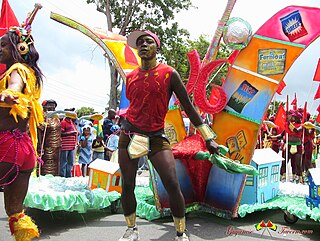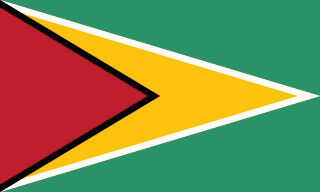Related Research Articles

The Caribbean Community is an organisation of fifteen Caribbean nations and dependencies having primary objectives to promote economic integration and cooperation among its members, to ensure that the benefits of integration are equitably shared, and to coordinate foreign policy. The organisation was established in 1973. Its major activities involve coordinating economic policies and development planning; devising and instituting special projects for the less-developed countries within its jurisdiction; operating as a regional single market for many of its members ; and handling regional trade disputes. The secretariat headquarters is in Georgetown, Guyana. CARICOM is an official United Nations Observer.
The music of Suriname is known for kaseko music, and for having an Indo-Caribbean tradition.
The music of Montserrat is influenced by Irish traditions, noticeable in the set dance-like Bam-chick-lay, and the presence of fife and drum ensembles similar to the bodhrán. Natives are also witness to the jumbie dance, the style of which is still strongly African. Instruments include the ukulele and shak-shak, an African instrument made from a calabash gourd; both of these are used in traditional string bands. Calypso and spiritual-influenced vocal choirs, like the Emerald Isle Community Singers, are popular.
The music of Guyana encompasses a range of musical styles and genres that draw from various influences including: Indian, Latino-Hispanic, European, African, Chinese, and Amerindian music. Popular Guyanese performers include: Terry Gajraj, Harry Panday, Eddy Grant, Dave Martins & the Tradewinds, Aubrey Cummings and Nicky Porter, and Shameer Rahman. The Guyana Music Festival has proven to be influential on the Guyana music scene.

Mashramani, often abbreviated to "Mash", is an annual festival that celebrates Guyana becoming a Republic in 1970. The festival, usually held on 23 February – Guyanese Republic Day – includes a parade, music, games and cooking and is intended to commemorate the "Birth of the Republic". In 2016, the Mashramani parade was held on May 26, the 50th anniversary of Guyana's independence, but the remainder of the celebration was held on the traditional February date.

Diabolical Masquerade was a Swedish one-man black metal band with progressive influences. The band was formed in 1993 in Stockholm as side project of Anders Nyström, known for his work as the guitarist of Katatonia.
Indo-Guyanese or Indian-Guyanese, are Guyanese nationals who trace their ancestry to South Asia. Majority of the ethnic group are said to be of Indian descent, and some are noted to have ancestry from Pakistan, Afghanistan.
The Cyril Potter College of Education is a higher education institution in Georgetown, Guyana.
Afro-Guyanese people are generally descended from slaves brought to the Guianas from the coast of West Africa to work on sugar plantations
The Wapichan or Wapishana are an indigenous group found in the Roraima area of southern Guyana and northern Brazil.
The Southern Caribbean is a group of islands that neighbor mainland South America in the West Indies. St. Lucia lies to the north of the region, Barbados in the east, Trinidad & Tobago at its southernmost point, and Aruba at the most westerly section.

"This Masquerade" is a song written by American singer and musician Leon Russell. It was originally recorded in 1972 by Russell for his album Carney and as a B-side for the album's hit single "Tight Rope". The song was then covered on Helen Reddy's 1972 album, I Am Woman. It was then recorded by American vocal duo, the Carpenters, for their 1973 album Now & Then and as the B-side of the Carpenters's single "Please Mr. Postman". Three years later, "This Masquerade" was recorded by American singer and guitarist George Benson, who released it on his 1976 album, Breezin'. Benson's version, featuring Jorge Dalto on piano, was released as a single and became the first big hit of his career.
The article describes the state of. race relations and racism in South America. Racism of various forms is found in every country on Earth. Racism is widely condemned throughout the world, with 170 states signatories of the International Convention on the Elimination of All Forms of Racial Discrimination by August 8, 2006. In different countries, the forms that racism takes may be different for historic, cultural, religious, economic or demographic reasons.

Guyanese people are people born in the country of Guyana, which is located on the northern coast of South America and is bordered by the Atlantic Ocean, Brazil, Venezuela and Suriname. Geographically, Guyana is part of the South American mainland, however it is much more culturally similar to the Suriname and nearby island nations of the Caribbean such as Trinidad and Tobago as compared to the rest of South America. In fact, Guyana is considered a Caribbean country even though it is not an island nation located in the Caribbean Sea, as are most Caribbean nations.
Guyanese Americans are Americans who can trace their ancestry back to Guyana. As of 2011, there are 208,899 Guyanese Americans currently living in the United States. The majority of Guyanese live in New York City – some 140,000 – making them the fifth-largest foreign-born population in the city.

Ian Michael Valz was a Guyanese playwright, award-winning filmmaker, and actor. On April 28, 2010 he died of cancer at St. Maarten Medical Center.
Masquerade is the fourth studio album by the artist The Legendary Tigerman, released in 2006.

Live On Fire is the third live album by the German guitar-player Axel Rudi Pell.
References
- Kuss, Malena (2004). Music in Latin America and the Caribbean: an encyclopedic history. University of Texas Press. ISBN 978-0-292-70951-5.